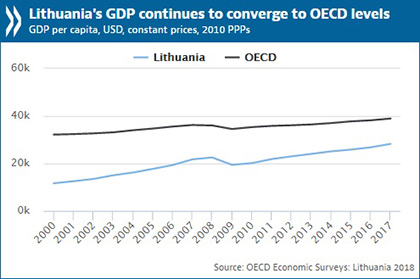Reforms in Lithuania are reinforcing economic growth but boosting productivity is still a challenge
Lithuania’s economy has grown faster than most other OECD economies over the past 10 years, unemployment continues to fall and public finances have stabilised after a long period of deficits and rising debt.

In a new report, however, the OECD says productivity has remained subdued, slowing down the convergence process as income remains at around two thirds of the OECD average. Income inequality is high and an ageing and declining population is putting pressure on the pension system.
The OECD Economic Survey of Lithuania praises the wide-reaching New Social Model reforms, implemented in 2017. It says they are expected to help reinvigorate inclusive growth, strengthen the social safety net and reinforce the sustainability of public finances.
Presenting the survey in Vilnius alongside Lithuanian Prime Minister Saulius Skvernelis and Finance Minister Vilius Šapoka, OECD Secretary-General Angel Gurría said: “The New Social Model showcases how an ambitious reform agenda can be brought through the political process. It is an impressive achievement. But big challenges still remain. Among them is population ageing, which is being intensified by many young Lithuanians leaving the country. Addressing emigration is a long-term endeavour which requires improving well-being and opportunities across the population”. Read the full speech.
The release of the survey took place the day Lithuania officially became the OECD’s 36th Member with the depositing in Paris of its Instrument of Accession to the OECD Convention. Lithuanian President Dalia Grybauskaitė signed an Accession Agreement with the OECD on 30 May 2018.
The survey says Lithuania needs to boost its relatively low productivity. The rate of productivity growth has fallen in recent years and there is a considerable mismatch between the skills of workers and the needs of businesses. It recommends strengthening work-based learning and to better adapt education to required skill levels.
To improve innovation, better coordination between business and research sectors is needed. Collaborative research should be privileged when allocating funds to public institutions.
Recent pension reforms, which form part of the New Social Model, have made the system more sustainable but the OECD says further steps are needed such as a rise in minimum pensions to reduce old-age poverty. Payments into pension funds should be made compulsory.
The survey also shows that Lithuania’s overall tax burden is below the OECD average and leans strongly toward labour and consumption while income and property are taxed relatively lightly. High labour taxes, especially for the low paid, are increasing informality. The tax mix could be made more inclusive by reducing social security contributions, particularly for the low paid. The base for property taxes should be broadened, and exemptions provided for low income households.
Source: Organization for Economic Co-operation and Development
- 248 reads
Human Rights
Ringing FOWPAL’s Peace Bell for the World:Nobel Peace Prize Laureates’ Visions and Actions

Protecting the World’s Cultural Diversity for a Sustainable Future

The Peace Bell Resonates at the 27th Eurasian Economic Summit

Declaration of World Day of the Power of Hope Endorsed by People in 158 Nations

Puppet Show I International Friendship Day 2020

